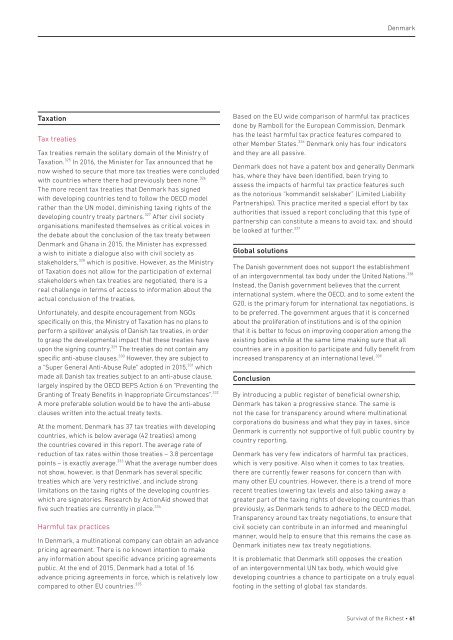You also want an ePaper? Increase the reach of your titles
YUMPU automatically turns print PDFs into web optimized ePapers that Google loves.
Denmark<br />
Taxation<br />
Tax treaties<br />
Tax treaties remain <strong>the</strong> solitary domain <strong>of</strong> <strong>the</strong> Ministry <strong>of</strong><br />
Taxation. 325 In 2016, <strong>the</strong> Minister for Tax announced that he<br />
now wished to secure that more tax treaties were concluded<br />
with countries where <strong>the</strong>re had previously been none. 326<br />
The more recent tax treaties that Denmark has signed<br />
with developing countries tend to follow <strong>the</strong> OECD model<br />
ra<strong>the</strong>r than <strong>the</strong> UN model, diminishing taxing rights <strong>of</strong> <strong>the</strong><br />
developing country treaty partners. 327 After civil society<br />
organisations manifested <strong>the</strong>mselves as critical voices in<br />
<strong>the</strong> debate about <strong>the</strong> conclusion <strong>of</strong> <strong>the</strong> tax treaty between<br />
Denmark and Ghana in 2015, <strong>the</strong> Minister has expressed<br />
a wish to initiate a dialogue also with civil society as<br />
stakeholders, 328 which is positive. However, as <strong>the</strong> Ministry<br />
<strong>of</strong> Taxation does not allow for <strong>the</strong> participation <strong>of</strong> external<br />
stakeholders when tax treaties are negotiated, <strong>the</strong>re is a<br />
real challenge in terms <strong>of</strong> access to information about <strong>the</strong><br />
actual conclusion <strong>of</strong> <strong>the</strong> treaties.<br />
Unfortunately, and despite encouragement from NGOs<br />
specifically on this, <strong>the</strong> Ministry <strong>of</strong> Taxation has no plans to<br />
perform a spillover analysis <strong>of</strong> Danish tax treaties, in order<br />
to grasp <strong>the</strong> developmental impact that <strong>the</strong>se treaties have<br />
upon <strong>the</strong> signing country. 329 The treaties do not contain any<br />
specific anti-abuse clauses. 330 However, <strong>the</strong>y are subject to<br />
a “Super General Anti-Abuse Rule” adopted in 2015, 331 which<br />
made all Danish tax treaties subject to an anti-abuse clause,<br />
largely inspired by <strong>the</strong> OECD BEPS Action 6 on “Preventing <strong>the</strong><br />
Granting <strong>of</strong> Treaty Benefits in Inappropriate Circumstances”. 332<br />
A more preferable solution would be to have <strong>the</strong> anti-abuse<br />
clauses written into <strong>the</strong> actual treaty texts.<br />
At <strong>the</strong> moment, Denmark has 37 tax treaties with developing<br />
countries, which is below average (42 treaties) among<br />
<strong>the</strong> countries covered in this report. The average rate <strong>of</strong><br />
reduction <strong>of</strong> tax rates within those treaties – 3.8 percentage<br />
points – is exactly average. 333 What <strong>the</strong> average number does<br />
not show, however, is that Denmark has several specific<br />
treaties which are 'very restrictive', and include strong<br />
limitations on <strong>the</strong> taxing rights <strong>of</strong> <strong>the</strong> developing countries<br />
which are signatories. Research by ActionAid showed that<br />
five such treaties are currently in place. 334<br />
Harmful tax practices<br />
In Denmark, a multinational company can obtain an advance<br />
pricing agreement. There is no known intention to make<br />
any information about specific advance pricing agreements<br />
public. At <strong>the</strong> end <strong>of</strong> 2015, Denmark had a total <strong>of</strong> 16<br />
advance pricing agreements in force, which is relatively low<br />
compared to o<strong>the</strong>r EU countries. 335<br />
Based on <strong>the</strong> EU wide comparison <strong>of</strong> harmful tax practices<br />
done by Ramboll for <strong>the</strong> European Commission, Denmark<br />
has <strong>the</strong> least harmful tax practice features compared to<br />
o<strong>the</strong>r Member States. 336 Denmark only has four indicators<br />
and <strong>the</strong>y are all passive.<br />
Denmark does not have a patent box and generally Denmark<br />
has, where <strong>the</strong>y have been identified, been trying to<br />
assess <strong>the</strong> impacts <strong>of</strong> harmful tax practice features such<br />
as <strong>the</strong> notorious “kommandit selskaber” (Limited Liability<br />
Partnerships). This practice merited a special effort by tax<br />
authorities that issued a report concluding that this type <strong>of</strong><br />
partnership can constitute a means to avoid tax, and should<br />
be looked at fur<strong>the</strong>r. 337<br />
Global solutions<br />
The Danish government does not support <strong>the</strong> establishment<br />
<strong>of</strong> an intergovernmental tax body under <strong>the</strong> United Nations. 338<br />
Instead, <strong>the</strong> Danish government believes that <strong>the</strong> current<br />
international system, where <strong>the</strong> OECD, and to some extent <strong>the</strong><br />
G20, is <strong>the</strong> primary forum for international tax negotiations, is<br />
to be preferred. The government argues that it is concerned<br />
about <strong>the</strong> proliferation <strong>of</strong> institutions and is <strong>of</strong> <strong>the</strong> opinion<br />
that it is better to focus on improving cooperation among <strong>the</strong><br />
existing bodies while at <strong>the</strong> same time making sure that all<br />
countries are in a position to participate and fully benefit from<br />
increased transparency at an international level. 339<br />
Conclusion<br />
By introducing a public register <strong>of</strong> beneficial ownership,<br />
Denmark has taken a progressive stance. The same is<br />
not <strong>the</strong> case for transparency around where multinational<br />
corporations do business and what <strong>the</strong>y pay in taxes, since<br />
Denmark is currently not supportive <strong>of</strong> full public country by<br />
country reporting.<br />
Denmark has very few indicators <strong>of</strong> harmful tax practices,<br />
which is very positive. Also when it comes to tax treaties,<br />
<strong>the</strong>re are currently fewer reasons for concern than with<br />
many o<strong>the</strong>r EU countries. However, <strong>the</strong>re is a trend <strong>of</strong> more<br />
recent treaties lowering tax levels and also taking away a<br />
greater part <strong>of</strong> <strong>the</strong> taxing rights <strong>of</strong> developing countries than<br />
previously, as Denmark tends to adhere to <strong>the</strong> OECD model.<br />
Transparency around tax treaty negotiations, to ensure that<br />
civil society can contribute in an informed and meaningful<br />
manner, would help to ensure that this remains <strong>the</strong> case as<br />
Denmark initiates new tax treaty negotiations.<br />
It is problematic that Denmark still opposes <strong>the</strong> creation<br />
<strong>of</strong> an intergovernmental UN tax body, which would give<br />
developing countries a chance to participate on a truly equal<br />
footing in <strong>the</strong> setting <strong>of</strong> global tax standards.<br />
<strong>Survival</strong> <strong>of</strong> <strong>the</strong> <strong>Richest</strong> • 61


